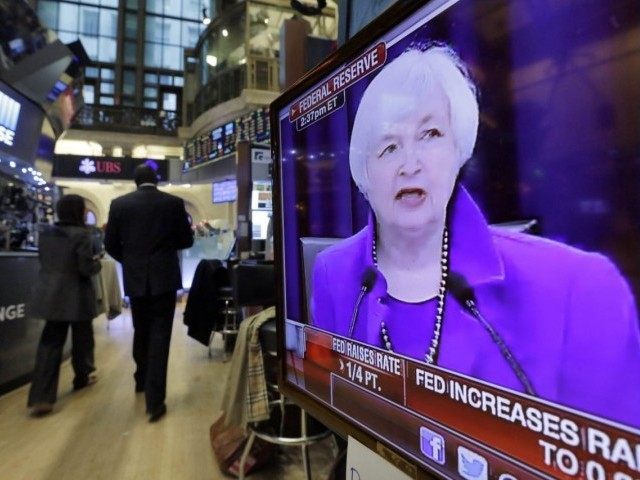Washington policymakers—and their colleagues abroad—have pursued reckless and irresponsible economic policies. The chickens are coming home to roost, and the Federal Reserve could easily push America into another recession.
Prior to the 2008 financial meltdown, governments in the United States, Europe, and Japan piled up debt to finance social programs they could not afford and encouraged private individuals to borrow too much against real estate. All this to maintain consumer spending and modest growth, when government regulators meddling in virtually every business and hiring decision curbed private investment.
China, instead of implementing needed market reforms, artificially suppressed the value of the yuan, subsidized domestic industries with easy credit, and protected them from foreign competition. Those boosted exports and accelerated the decline of manufacturing in western economies.
When the credit bubbles burst, western leaders uniformly scapegoated the banks. And they further expanded social spending, failed to reform oppressive business regulations, and appeased China on currency manipulation and protectionism that together were holding up growth in the first place.
With the banks now constrained by examiners peeking over their every shoulder and less inclined to lend, central banks recklessly printed money to pump liquidity directly into credit markets. For example, quantitative easing has boosted Bank of Japan holdings to a whopping 75 percent of GDP.
In Japan and Europe, monetary authorities have now pushed interest rates below zero—banks now charge large depositors for the privilege of stashing cash—and have joined China in pushing their currencies down against the dollar.
Cheap currencies boosted exports a bit but absent more fundamental reforms, those can’t resurrect growth.
U.S. growth during the Bush-Obama era is about half that accomplished during the Reagan-Clinton years and again appears to be faltering. Jobs creation may still look good for now but hiring decisions tend to lag changes in broader conditions and could quickly go south.
Right now, the U.S. economy is held up by consumer spending. Few private businesses are willing to finance new projects with credit remaining tight and Washington tagging them the villain for all of society’s problems.
A year ago conditions were better, but the Fed missed the opportunity to begin raising interest rates to more normal levels, and finally increased those marginally above zero in December.
Now the Fed is between a rock and a hard place. If it raises rates further, it will suppress faltering business investment and sales of big ticket consumer items, such as cars and appliances. But taking interest rates into negative territory in the style of the Bank of Japan and European Central Bank, risks destabilizing financial markets.
Japanese and European monetary authorities are discovering banks face difficulties charging most depositors for the privilege of keeping money in their vaults, and negative interest rates don’t encourage more lending when banks see mindless government regulation, not the cost of money, as the problem.
More importantly, negative interest rates drive down bank profits and stock prices!
The realization that central banks have it wrong—pushing down currencies against the dollar don’t resurrect growth and negative interest rates only serve to destabilize banks—is causing capital flight of all kinds. In China investors are selling stocks and rushing into dollars and in Japan and Europe, they are dumping stocks for government bonds.
During recent testimony in Congress, Fed Chairwoman Yellen acknowledged deteriorating foreign economic conditions and stock market turbulence pose risks for the U.S. economic expansion—tepid as it may be—but paradoxically stated both her desire to raise interest rates and that she is considering negative interest rates.
Plainly, Yellen is clueless about what to do next, and won’t call out the Administration for spending and regulating business too much and making the Fed’s job impossible.
Yellen hardly inspires confidence, and that is a prescription for disaster.
Peter Morici is an economist and business professor at the University of Maryland, and a national columnist. He tweets @pmorici1.

COMMENTS
Please let us know if you're having issues with commenting.